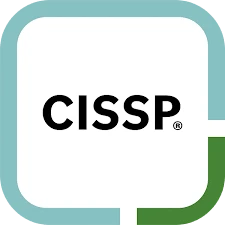Skaffa nya IT-kunskaper, bli certifierad och lyft din IT-karriär till nya höjder utan att spränga banken!
Unlimited Training - IT kurser och certifieringar gjort enkla och otroligt billiga. Få tillgång till 60+ LIVE-kurser för mindre än priset för en kurs.











course: ISC2 CISSP - Certified Information Systems Security Professional
Varighet: 5 days
Format: Virtual or Classroom
![]() Förbereder till Examen :
ISC2 Certified Information Systems Security Professional Exam (CISSP)
Förbereder till Examen :
ISC2 Certified Information Systems Security Professional Exam (CISSP)
![]() Förbereder till Certifiering :
ISC2 Certified Information Systems Security Professional (CISSP)
Förbereder till Certifiering :
ISC2 Certified Information Systems Security Professional (CISSP)
Lyft din cybersäkerhetskarriär med ISC2 CISSP - guldstandarden inom informationssäkerhetscertifieringar och utbildning. Validera din expertis i att designa, implementera och hantera en säker IT-miljö. Få erkännande globalt som en certifierad informationssystemsäkerhetsspecialist, lås upp möjligheter och etablera dig som en pålitlig ledare inom det ständigt utvecklande området cybersäkerhet.
CISSP-certifieringen (Certified Information Systems Security Professional) är för yrkesverksamma inom informationssäkerhet med minst fem års erfarenhet inom två eller fler av de åtta domänerna som omfattas av CISSP Common Body of Knowledge (CBK). Det är idealiskt för dem som är involverade i att designa, implementera och hantera säkerhetsprogram, med en omfattande förståelse för bästa säkerhetspraxis, policyer och procedurer. Certifieringen täcker olika domäner såsom säkerhet och riskhantering, tillgångssäkerhet och mjukvaruutvecklingssäkerhet. Det bekräftar din kunskap och erfarenhet inom informationssäkerhet och ditt engagemang för att upprätthålla professionalism i branschen.

Fantastisk instruktör! Gjorde en tuff kurs online till en så intressant och behaglig upplevelse

Instruktören hade en fantastisk förståelse för alla domäner och kunde överföra denna kunskap i ett behagligt tempo med riktiga exempel från verkligheten
Ditt personliga Learning Program ger dig de färdigheter du behöver så att du kan göra mer av det du älskar. Learning Programmet's tre steg är utformade så att du lär dig nya färdigheter som kommer att öppna upp nya möjligheter för dig.

Readynez365 plattformen erbjuder en digital väg för alla dina inlärningsresurser, från förberedelser till examen, vilket gör det till en smidig väg till nya tekniska färdigheter. Välj vad du vill (och har behov av) för att bli redo. Allt är gjort klart för dig i Readynez365 i god tid för dina utbildningar.
Utbildningsmetodiken är designad till det virtuella klassrummet med fokus på att inspirera och engagera dig med en blandning av praktisk utbildning, presentationer, tekniska labbar och tester. Virtuell utbildning uppskattas också av ledare då det är det mest kostnadseffektiva sättet att utbilda på.
Det finns ett maximalt antal deltagare på utbildningen för att säkerställa enkel tillgång till personlig coaching. Du möter ackrediterade expertinstruktörer som är erfarna IT-proffs och konsulter, certifierade på högsta nivå och som tar med verkligheten in i undervisningen.
Vi täcker alla detaljer så du kan använda det i ditt dagliga arbete och du kommer även lära dig detaljerna du behöver för att klara din examen. Det är ditt beslut om du vill genomföra examen eller inte men med våra detaljerade examensguides och hotline gör vi det enkelt för dig att få tillgång till dina examensvouchers och planera och genomföra din examen online.
Din tillgång till utbildning är obegränsad och du kan utbilda dig så mycket du vill tills du klarar din examen.
Lär dig med gott samvete med utbildningar som ger 96% lägre CO2-utsläpp jämfört med klassrumsutbildning. Vår organisation arbetar med minimal miljöpåverkan och vi har reducerat CO2-utsläppen med 96% sedan 2019. Vi följer ISO 14001 genom hela leveransprocessen som din garanti för hållbar utbildning.
- Konfidentialitet, integritet och tillgänglighetskoncept
- Principer för säkerhetsstyrning
- Efterlevnad
- Juridiska och regulatoriska frågor
- Yrkesetik
- Säkerhetspolicyer, standarder, procedurer och riktlinjer
- Information och tillgångsklassificering
- Ägarskap (t.ex. dataägare, systemägare)
- Skydda integriteten
- Lämplig retention
- Datasäkerhetskontroller
- Hanteringskrav (t.ex. märkningar, etiketter, förvaring)
- Konstruktionsprocesser med säkra designprinciper
- Säkerhetsmodeller grundläggande begrepp
- Säkerhetsutvärderingsmodeller
- Säkerhetsmöjligheter för informationssystem
- Säkerhetsarkitekturer, designs och lösningselements sårbarheter
- Webbaserade systemsårbarheter
- Sårbarheter i mobila system
- Inbäddade enheter och sårbarheter i cyberfysiska system
- Kryptografi
- Plats- och anläggningsdesign säkra principer
- Säker nätverksarkitekturdesign (t.ex. IP- och icke-IP-protokoll, segmentering)
- Säkra nätverkskomponenter
- Säkra kommunikationskanaler
- Nätverksattacker
- Fysisk och logisk tillgångskontroll
- Identifiering och autentisering av personer och enheter
- Identitet som en tjänst (t.ex. molnidentitet)
- Identitetstjänster från tredje part (t.ex. på plats)
- Åtkomstkontrollattacker
- Bedömnings- och teststrategier
- Säkerhetsprocessdata (t.ex. hantering och operativa kontroller)
- Säkerhetskontrolltestning
- Testutgångar (t.ex. automatiserade, manuella)
- Säkerhetsarkitekturs sårbarheter
- Utredningsstöd och krav
- Loggning och övervakning av aktiviteter
- Tillhandahållande av resurser
- Grundläggande koncept för säkerhetsoperationer
- Teknik för resursskydd
- Incidenthantering
- Förebyggande åtgärder
- Patch- och sårbarhetshantering
- Förändringshanteringsprocesser
- Återhämtningsstrategier
- Katastrofåterställningsprocesser och planer
- Kontinuitetsplanering och övningar
- Personalsäkerhet
- Säkerhet i mjukvaruutvecklingens livscykel
- Säkerhetskontroller för utvecklingsmiljö
- Säkerhetseffektivitet för programvara
- Förvärvad mjukvarusäkerhetseffekt
Möt några av de instruktörer du möter på din kurs. De är experter, passionerade inom sina områden och dedikerade till att hjälpa de som vill lära sig, utforska och bli framgångsrika i sina karriärer.

Kevin Henry är en globalt erkänd expert som i över 20 år har bidragit till att utbilda och certifiera människor inom IT-säkerhet, inklusive CISSP, CISM, CISA och andra.

Friedhelm har mer än 30 års erfarenhet inom IT, säkerhet och datasekretess som senior informationssäkerhetskonsult.

James Rowney är en välkänd expert med över 20 års bidrag till utbildning av IT-säkerhetsfärdigheter.
På Readynez tillhandahåller vi många resurser och har erfarna experter inom området. Därför har vi också stora framgångar med många nöjda kunder. Du kan därför tryggt gå din kurs hos oss. För att gå ISO 27001 Lead implementer-kursen finns det några förkunskaper.
Med 15 års erfarenhet och fler än 50.000 nöjda kunder från hela världen litar organisationer som ALSO, ATEA, Microsoft, Serco och många fler på Readynez att utbilda och certifiera deras medarbetare.
![[Dictionary item: Green-check]](/images/green-check.png) Toppbetyg på kurser där flest deltagare ger kursen 10/10
Toppbetyg på kurser där flest deltagare ger kursen 10/10![[Dictionary item: Green-check]](/images/green-check.png) 50.000 deltagare utbildade och certifierade
50.000 deltagare utbildade och certifierade![[Dictionary item: Green-check]](/images/green-check.png) Globalt erkända expertinstruktörer, flertalet MVP
Globalt erkända expertinstruktörer, flertalet MVP![[Dictionary item: Green-check]](/images/green-check.png) Pålitlig leverantör av stora utbildningsprojekt för många stora organisationer
Pålitlig leverantör av stora utbildningsprojekt för många stora organisationerDetta är bara några av de många organisationer som litar på Readynez





Avancera din karriär med ISC2 CCSP - Certified Cloud Security Professional. Vår expertledda utbildning förbereder dig för framgång i CCSP-certifieringsprovet, vilket lyfter din karriär till nya höjder. Få djupgående kunskaper om molnsäkerhet, bli certifierad och förbättra dina färdigheter för att möta branschens krav.
SE KURSSkapa en väg till framgångss med ISACA CISM-certifiering, en höjdpunkt inom informationssäkerhetshantering. Få expertutbildning för CISM-provet, bli certifierad och stärk din roll som ledare för att skydda informationstillgångar. Lyft din karriär till nya höjder med en certifiering som skiljer dig åt inom cybersäkerhetsområdet. Lyft dina färdigheter, avancera i din karriär och säkra en framtid i framkant av informationssäkerhet.
SE KURSCertified Information Systems Security Professional (CISSP) är en informationssäkerhetscertifiering. International Information System Security Certification Consortium, eller (ISC)2, tilldelar CISSP, en oberoende informationssäkerhetscertifiering. Över hela världen finns det 152 632 medlemmar i (ISC)2 som innehar CISSP-certifieringen.
Säkerhetsexperter som framgångsrikt genomför det upp till fyra timmar långa Certified Information Systems Security Professional (CISSP) examen är erkända som experter inom tio olika områden: passersystem och metodik; katastrofåterställningsplanering; fysisk säkerhet; operationer; säkerhet; hanteringsmetoder; telekommunikation och nätverkssäkerhet.
Studiet av juridik, utredning och etik, såväl som kryptografi, säkerhetsarkitektur, applikations- och systemutveckling och andra relaterade fält, är obligatoriska läroplaner i CISSP-provet.
Den idealiska kandidaten måste ha minst fem års betald arbetslivserfarenhet inom minst två av CISSP CBK:s åtta domäner. En fyraårig högskoleexamen eller regional motsvarande, eller en legitimation från (ISC)2 godkända listan, kommer att tillfredsställa ett år av den erforderliga erfarenheten.
En CISSP-certifiering kräver minst fem års heltid, betald arbete som säkerhetsanalytiker inom två eller flera av de åtta områden som ingår i CISSP, såsom kryptografi och mjukvaruutvecklingssäkerhet.
Om du har en högskoleexamen och ytterligare meriter som har godkänts av styrelsen kan du vara berättigad till en erfarenhetsavskrivning. När du har samlat på dig den nödvändiga arbetserfarenheten kan du också bli en Associate of the (ISC) och få CISSP-legitimationen. Förbered dig för och klara testet är vad som återstår att göra. För att klara provet måste du få minst 700 poäng av 1000 möjliga.
När du har klarat provet behöver du ett godkännande från en (ISC) expert som kan validera dina kriterier för yrkeserfarenhet, såsom hur länge du har arbetat inom området, ditt rykte och din fortbildning som en säkerhetsanalytiker. Ett professionellt stöd från en nuvarande medlem är det främsta skälet till att gå med och delta i professionella organisationer och seminarier. Det här är bra karriärdrag som kan hjälpa dig att få rekommendationer för din CISSP-ansökan från potentiella sponsorer.
Om du vill behålla din CISSP-certifiering aktiv måste du göra om provet vart tredje år och betala den årliga underhållsavgiften på $85 till organisationen. CPE-poäng krävs för att behålla certifieringen vart tredje år, med minst 20 poäng per år. Den årliga underhållsavgiften och 40 CPE-poäng krävs för omcertifiering.
Typiska jobbroller för personer som innehar denna certifiering är:
CISSP-certifieringar är giltiga i totalt tre år. För förnyelse är att ta om kursen och provet ett alternativ, liksom att tjäna och skicka in 120 poäng för fortbildning (CPE) under treårsperioden.
CISSP-provet kostar vanligtvis $699, men det exakta priset och extra avgifter varierar beroende på plats. Om du behöver boka om ditt test måste du betala en straffavgift på 50 USD.
CISSP-provet ingår inte i din Readynez-kurs.
Som en del av CISSP-certifieringsutbildningen lär du dig hur du definierar IT-arkitekturen och hur du bygger och underhåller säkra affärsmiljöer med hjälp av internationellt erkända informationssäkerhetsstandarder. CISSP-certifieringsprovet administreras av (ISC)2 och testar dina kunskaper om aktuella industristandarder och bästa praxis, i ämnen som:
Kursplanen för CISSP-provet innehåller följande domäner:
Det virtuella klassrummet är ett onlineforum där du kommer att gå med din instruktör och dina klasskamrater i realtid. Allt händer live och du kan interagera fritt, diskutera, ställa frågor och se din instruktör presentera på en whiteboard, diskutera kursmaterial och bilder, arbeta med laborationer och granska.
Ja, du kan göra tentor från alla större leverantörer som Microsoft, Cisco etc från bekvämligheten av ditt hem eller kontor.
Med Readynez gör du vilken kurs som helst i ditt hem eller på kontoret. Readynez ger stöd och bästa praxis för ditt klassrum hemma och du kan njuta av lärande med minimal inverkan på ditt dagliga liv. Dessutom sparar du kostnaderna och miljöbelastningen med att resa.
Tja, lärande är obegränsat när du är motiverad, men du behöver rätt väg för att uppnå det du vill. Readynez konsulter har många års erfarenhet av att anpassa elevvägar och vi kan designa en för dig också. Vi finns alltid tillgängliga med hjälp och vägledning, och du kan nå oss på chatten eller skriva till oss på info@readynez.com.
Vår CISSP utbildning är en 5-dagars CISSP kurs.
Ja, vår CISSP Certifiering är virtuellt tillgänglig.
Datum:
Tider:

